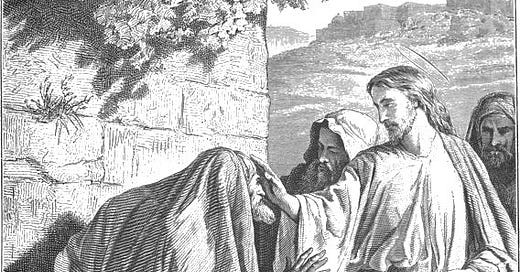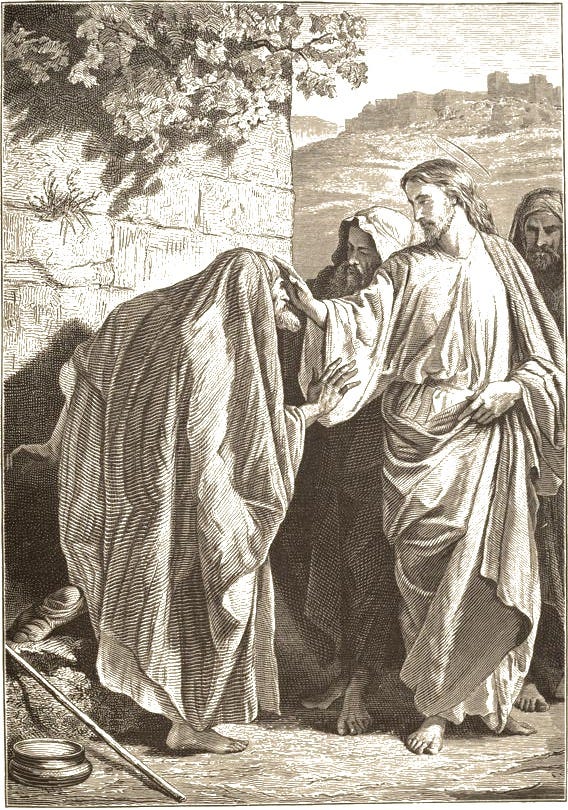1.
Christians believe that Jesus was many things:
A real live historical figure.
Generally a pretty good dude who was empathetic and caring and loving; a good model for humanity.
The son of God.
Also God Himself.
And the Messiah too.
I happen to be a Jew, and also… let’s say agnostic, so 3-5 are out.
recently defended #1 at length, and I’m convinced it’s true. But I think #2 is still up-for-grabs, so I’m gonna argue against it, at least in part.In the Bible, there are lots of instances of Jesus doing good and decent things for people—curing lepers, feeding the hungry, fucking prostitutes,1 and so on. These little actions are all very beneficent and virtuous, but I care about impact, and no part of Jesus’ moral philosophy has been more impactful than the Sermon on the Mount.
Jesus covers a lot in the Sermon—like any good rabbi, he stretches a lesson worth two minutes into a disorganized fifteen-minute ramble full of redundancies and strange anecdotes.
But there’s some good stuff in there! Matthew 7:5 is a favorite of mine—“First remove the plank from your own eye, and then you will see clearly to remove the speck from your brother’s eye.”2
Of course, there’s also some silliness:
You have heard that it was said to those of old, ‘You shall not commit adultery.’ But I say to you that whoever looks at a woman to lust for her has already committed adultery with her in his heart.
And a bit of ascetic horror:
If your right eye causes you to sin, pluck it out and cast it from you; for it is more profitable for you that one of your members perish, than for your whole body to be cast into hell. And if your right hand causes you to sin, cut it off and cast it from you; for it is more profitable for you that one of your members perish, than for your whole body to be cast into hell.
Plus the usual pompous Christly blasphemy:
Do not think that I came to destroy the Law or the Prophets. I did not come to destroy but to fulfill.
(Spoiler alert: he destroyed the Law and the Prophets!)
All this is beside the point, though. The only bit anyone remembers from the Sermon is its opening—the Beatitudes.
2.
And, let’s be totally honest, no one has the attention span to read more than three or four sentences in one sitting anymore. Of course, Jesus in His infinite Wisdom totally saw this Coming, and made sure not to bury the lede. He gets through all the good stuff within Matthew 5:3-5:
Blessed are the poor in spirit,
For theirs is the kingdom of heaven.Blessed are those who mourn,
For they shall be comforted.Blessed are the meek,
For they shall inherit the earth.
This all seems vaguely fine, right? What’s wrong with loving the poor and the meek and promising them redemption? Everyone likes the underdog; Jesus seems pretty tapped-in to intuitive human morality. Certainly, he was doing a better job than those rich, stuck-up, Greekifying3 Sadducees in the Temple. And he was obviously a lot more grounded and caring than the pharisaic wordcel Pharisees.
Hm—well, what kind of laws were the Pharisees so pharisaically following again?
As it turns out, they called it the Law—Torah, if you want to be fancy about it—and it had some things to say about how the poor and the meek should be treated. This comes straight from God, I’ll remind you:
You shall not render an unfair decision: do not favor the poor or show deference to the rich; judge your kin fairly.
And when God says, “fairly,” he means equally—not equitably. In Exodus, the Israelites are told to take a census and levy a poll tax:
Everyone who is entered in the records, from the age of twenty years up, shall give God’s offering:
the rich shall not pay more and the poor shall not pay less than half a shekel when giving God’s offering as expiation for your persons.
Jesus, on the other hand, gets real woke about the sins of the rich:
No one can serve two masters; for either he will hate the one and love the other, or else he will be loyal to the one and despise the other. You cannot serve God and mammon [lit. riches]
The New Testament is full of glorifications of poverty and weakness, and vilifications of wealth and power. Here’s the classic Gospel of Bernie Sanders Luke 18:25:
it is easier for a camel to go through the eye of a needle than for a rich man to enter the kingdom of God.
3.
Let’s first establish that all this is prima facie silly and immoral with an unfortunately paywalled post from the great
:Luckily, the big important idea is sitting in the free-to-see introduction. It has to do with the common tendency to
[think] that something is more important when it affects just a subgroup than when it affects all of those people and more. The smaller problem gets conceived as an injustice, whereas the larger problem calls for “mere” beneficence. Injustice takes priority over beneficence.
Remind you of any false Messiahs?
Jesus was a really effective populist agitator—pulling stunts like the overturning of the tables of the money changers—but he wasn’t a great moralist. In assigning the entire “kingdom of heaven” to the poor and claiming that it’s all-but-impossible for a rich man to make it in alongside them, Jesus commits the fallacy of Woke Axiology.
Sure, some rich people act immorally, and most could stand to make greater donations to the needy—but should they really be excluded from heaven as a whole? And do all the poor and meek really deserve a place there?
makes two excellent general economic points that cash out to answering, “no and no.”Rich people are still people, and deserve to buy themselves whatever quality of life they can afford—all it means to be rich is to be able to afford somewhat more. We all know and accept this on a rational level, but don’t say it out loud because there are fewer rich people than non-rich, and social desirability bias dictates that we shun the smaller group.
The obvious extension of this is: rich people deserve a slice of the afterlife pie as big as anyone else’s. If being rich doesn’t mean that their lives should be worse than other people’s, why would it mean that their afterlives should be?
There is such a thing as a Culture of Poverty, and poor people are at least sometimes responsible for their own lot. Much of the time, if they chose to begin living more virtuous and reasonable lives, they could improve their circumstances. If anything, poverty is a signal that someone isn’t putting in all the effort they could be. A key aspect of poverty culture is failure to plan ahead, failure to value delayed gratification.
What does Jesus say on the Mount?
do not worry about tomorrow, for tomorrow will worry about its own things. Sufficient for the day is its own trouble.
It seems like Jesus isn’t actually thinking very carefully about how to maximize human wellbeing—he’s just aggrieved, or good at pretending to be, on behalf of the poor. He speaks their language of immediacy and jealousy, and readily assures them that they’ll soon have a whole kingdom all for themselves.
4.
Is there anything redeemable about the Redeemer’s position?
The most obvious justification for his economic radicalism comes from various allegations of corruption and aristocratic nastiness going on in Judea.
These seem fairly well-founded—it looks like the Temple itself was engaged in predatory lending, and even if it wasn’t, the Sadducee priests weren’t particularly pleasant people. They arrogantly took their name from tzadok—Hebrew for “right” or “just”—and levied extra taxes on top of the Roman ones to maintain their aristocracy.
Jesus looked at all this, compared it to the various Old Testament mandates to give to charity, and decided a radical vibe shift was necessary. In other words, he was seeking equality, but figured all the past discrimination the Sadducees had done could only be remedied by a bit of present discrimination in favor of the poor.
I mean, this is the son of God we’re talking about! Surely he can do better than prescribe an endless ping-ponging of injustice one way, and then reactionary injustice back the other. Why not encourage rich people to give a little more tzedakah? Why malign them constantly instead?
Jesus did a lot of nice things for a lot of people. But his moral and political philosophy was lazy and populistic, especially compared to the Old Testament’s straight-shooting wisdom.
Christians: do 👏 better 👏
Lukethoughts
“I think it’s interesting how brands compete with each other on products that are practically identical. One will be priced at 120 and the other at 90 but we still purchase the 120 one out of convenience and recognition of ‘quality’.” (Ed. note: Yeah, seems like this is a pretty good way for some people to pay a reasonable amount for an acceptably-effective widget [90] and others to pay more for exceptional quality [120]. What a great system! Wouldn’t it be a shame if there were really vitally important goods that didn’t work this way because the FDA is stupid?)
“Ari is dying guys, send prayers.” (Ed. note: Yep, so long as they’re Jewish ones. I have the sniffles! Might be the end for me…)
“I want everyone to know I am the reason that Ari’s blog is good.” (Ed. note: All I see is “Ari’s blog is good.”)
Yeah, turns out this one isn’t true, but I think it’s too funny not to include. Mary Magdalene was probably actually just some rich broad Jesus was gold-digging—but the fact he was hanging out with a woman at all was pretty cool, I guess, given the time.
For the record, I only like it so long as I’m the brother and you’re the you. Also, I’m fairly certain my eye is totally speckless, so shut up.
I’m aware that “Hellenize” is a word, and yet I’ll never use it.








I know this piece is a little bit tongue and cheek, but rich people *did* behave different in the ancient world than they do today. Much more likely to be expropriators! What’s more, poor people and beggars were everywhere. Most/all societies before the last couple hundred years didn’t grow enough food, so like 20% of the population could literally not do anything but beg. I’m open to the idea that Christian populism is overrated, but not sure if this is it.
That's a real flippable-looking table you got there.